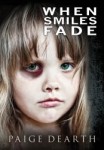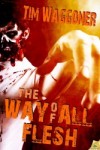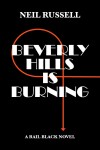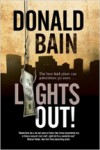

April 28 – May 4: “Share an anecdote from when you used an incident from your own life in a novel.”
 This week ITW Members Mark Alpert, Colin Campbell, Paige Dearth, Tim Waggoner Bernard Maestas, Donald Bain, Neil Russell and Shelley Coriell share an anecdote from when they used a real-life incident in a novel. Bonus question: “Do readers sometimes relay their own stories from real life that dovetail with your story?”
This week ITW Members Mark Alpert, Colin Campbell, Paige Dearth, Tim Waggoner Bernard Maestas, Donald Bain, Neil Russell and Shelley Coriell share an anecdote from when they used a real-life incident in a novel. Bonus question: “Do readers sometimes relay their own stories from real life that dovetail with your story?”
~~~~~
 Mark Alpert is author of The Furies, a new thriller from Thomas Dunne Books/St. Martin’s Press. A contributing editor at Scientific American, he specializes in weaving real science into his novels. His earlier thrillers — Final Theory, The Omega Theory and Extinction — have been published in twenty-three languages. He lives in Manhattan with his wife and two children and is a proud member of Scientific American’s softball team, the Big Bangers.
Mark Alpert is author of The Furies, a new thriller from Thomas Dunne Books/St. Martin’s Press. A contributing editor at Scientific American, he specializes in weaving real science into his novels. His earlier thrillers — Final Theory, The Omega Theory and Extinction — have been published in twenty-three languages. He lives in Manhattan with his wife and two children and is a proud member of Scientific American’s softball team, the Big Bangers.
 Ex-policeman. Ex-soldier. International tennis player. And full-time crime novelist. Colin Campbell is a retired police officer in West Yorkshire, having tackled crime in one of the UK’s busiest cities for 30 years. He is the author of UK crime novels, Blue Knight White Cross and Northern Ex, and US thrillers Jamaica Plain and Montecito Heights featuring rogue Yorkshire cop Jim Grant. He counts Lee Child and Matt Hilton among his fans.
Ex-policeman. Ex-soldier. International tennis player. And full-time crime novelist. Colin Campbell is a retired police officer in West Yorkshire, having tackled crime in one of the UK’s busiest cities for 30 years. He is the author of UK crime novels, Blue Knight White Cross and Northern Ex, and US thrillers Jamaica Plain and Montecito Heights featuring rogue Yorkshire cop Jim Grant. He counts Lee Child and Matt Hilton among his fans.
 Paige Dearth was a victim of child rape and spent her early years yearning desperately for a better life. Living through the fear and isolation that marked her youth, she found a way of coping with the trauma of her past and the angst that scarred her present: she developed the ability to dream up stories grounded in reality that would prove cathartic for her and provide her with a creative outlet. Paige’s novels are a fine balance between what lives on in her imagination and the evil that lurks in the real world.
Paige Dearth was a victim of child rape and spent her early years yearning desperately for a better life. Living through the fear and isolation that marked her youth, she found a way of coping with the trauma of her past and the angst that scarred her present: she developed the ability to dream up stories grounded in reality that would prove cathartic for her and provide her with a creative outlet. Paige’s novels are a fine balance between what lives on in her imagination and the evil that lurks in the real world.
 Shirley Jackson Award-nominated author Tim Waggoner has published over thirty novels and three short story collections of dark fiction. He teaches creative writing at Sinclair Community College and in Seton Hill University’s Master of Fine Arts in Writing Popular Fiction program.
Shirley Jackson Award-nominated author Tim Waggoner has published over thirty novels and three short story collections of dark fiction. He teaches creative writing at Sinclair Community College and in Seton Hill University’s Master of Fine Arts in Writing Popular Fiction program.
 Bernard Maestas lives in paradise. A police officer patrolling the mean streets of Hawaii, he has a background in contract security and military and civilian law enforcement. When not saving the world, one speeding ticket at a time, and not distracted by video games or the internet, he is usually hard at work on his next book. You can learn more about SAY THAT TO MY FACE, Bernard Maestas and his work on his official Facebook Page.
Bernard Maestas lives in paradise. A police officer patrolling the mean streets of Hawaii, he has a background in contract security and military and civilian law enforcement. When not saving the world, one speeding ticket at a time, and not distracted by video games or the internet, he is usually hard at work on his next book. You can learn more about SAY THAT TO MY FACE, Bernard Maestas and his work on his official Facebook Page.
 Neil Russell is founder and president of Site 85 Productions, an entertainment-focused intellectual property rights company based in Beverly Hills. He is a former senior executive with Paramount, Columbia, MGM, United Artists and Carolco—the company that produced the Rambo movies, Terminator 2, Total Recall and Basic Instinct. Site 85 has entered into rights agreements with numerous companies, including Jerry Bruckheimer Films, Columbia, Disney, Universal, Warners, Fox, ABC, NBC, CBS, F/X, Activision and many others.
Neil Russell is founder and president of Site 85 Productions, an entertainment-focused intellectual property rights company based in Beverly Hills. He is a former senior executive with Paramount, Columbia, MGM, United Artists and Carolco—the company that produced the Rambo movies, Terminator 2, Total Recall and Basic Instinct. Site 85 has entered into rights agreements with numerous companies, including Jerry Bruckheimer Films, Columbia, Disney, Universal, Warners, Fox, ABC, NBC, CBS, F/X, Activision and many others.
 Donald Bain is the author or ghost/author of more than 120 books, including collaborating with his wife Rénee Paley-Bain on 43 original murder mysteries in the “Murder, She Wrote” series. He also writes Washington-based thrillers in the Margaret Truman Capital Crimes series (Undiplomatic Murder comes out in July), and his novel, Lights Out! will be published in May. He can be reached at www.donaldbain.com, and is represented by the D4EO Literary Agency.
Donald Bain is the author or ghost/author of more than 120 books, including collaborating with his wife Rénee Paley-Bain on 43 original murder mysteries in the “Murder, She Wrote” series. He also writes Washington-based thrillers in the Margaret Truman Capital Crimes series (Undiplomatic Murder comes out in July), and his novel, Lights Out! will be published in May. He can be reached at www.donaldbain.com, and is represented by the D4EO Literary Agency.
 Shelley Coriell is an award-winning author of romantic suspense and novels for teens. Her debut suspense, The Broken, kicks off the Apostles Series from Grand Central Forever and received a starred review from Publishers Weekly. A six-time Romance Writers of America Golden Heart Finalist, Shelley lives in Arizona with her family and the world’s neediest rescue weimaraner.
Shelley Coriell is an award-winning author of romantic suspense and novels for teens. Her debut suspense, The Broken, kicks off the Apostles Series from Grand Central Forever and received a starred review from Publishers Weekly. A six-time Romance Writers of America Golden Heart Finalist, Shelley lives in Arizona with her family and the world’s neediest rescue weimaraner.
- LAST GIRL MISSING with K.L. Murphy - July 25, 2024
- CHILD OF DUST with Yigal Zur - July 25, 2024
- THE RAVENWOOD CONSPIRACY with Michael Siverling - July 19, 2024
